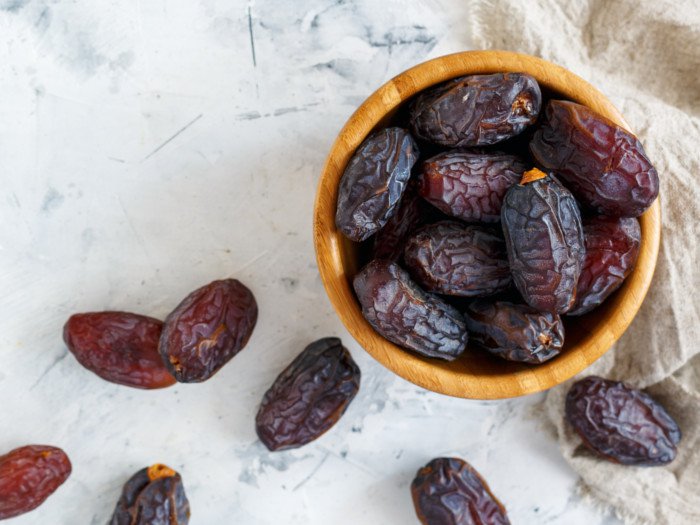Rich in various nutrients, fiber, and antioxidants, dates are popular throughout the world and are consumed as a dried fruit.
A 2008 review published in Critical Reviews in Food Science and Nutrition journal by Cornell researchers Chang Yong Lee and Mohamed Ali Al-Farsi suggests that over 15% of the daily requirement of essential minerals such as copper, potassium, magnesium, and selenium can be fulfilled by consuming 100 grams, or about 4 pitted dates per day.
The Institute of Medicine recommends an intake of 25-38 grams of dietary fiber per day, which can be high fiber supplied through high fiber foods like dates. It is also said that consuming these dried fruits can promote eye health and may be effective in guarding against vision problems like night blindness. Medjool dates, in particular, are one of the popular varieties that have many benefits.
According to USDA, dates are a good source of energy, fiber, sugar, and various vitamins and minerals. Essential minerals such as calcium, iron, phosphorus, sodium, potassium, magnesium, sulfur, and zinc can be found in them. Apart from the above-mentioned nutrients, they also contain important vitamins such as thiamin, riboflavin, niacin, vitamin B6, folate, vitamin A, and vitamin K.
Dates are high in natural sugars like glucose, fructose, and sucrose. The high energy present in them can be attributed to this high sugar content. Many people around the world eat natural low-fat dates for a quick afternoon snack when they are feeling lethargic or sluggish to help bump up energy levels fast.
Often when you exercise in a gym, outside or even on a stretching machine at home, you feel exhausted. A study published in the International Journal of Food Sciences and Nutrition, suggests that dates rich in essential nutrients may help you regain your energy immediately.
People who follow Islam and observe fastings, break their fast by eating them along with water. This also helps avoid overeating of food once the fast is over. When the body begins to absorb their high nutritional content, feelings of hunger are pacified.
A study led by Musthafa Mohamed Essa, Ph.D. [7] et al. suggests that dates protect against oxidative stress and inflammation in the brain. According to research, “date palm fruits are a good source of dietary fiber and are rich in total phenolics and natural antioxidants, such as anthocyanins, ferulic acid, protocatechuic acid, and caffeic acid”. [8] The presence of these polyphenolic compounds could potentially help slow the progression of Alzheimer’s disease and dementia.
Research suggests dates contain insoluble and soluble fibers, as well as many beneficial amino acids which can stimulate the digestion of food and ensure quick passage through the gastrointestinal tract. [14] According to a review published in the Journal of Nutrition Reviews, the fiber may also aid in the treatment of conditions like gastroesophageal reflux disease (GERD), diverticulitis and hemorrhoids.
Dates are a good source of many nutrients, including iron. A deficiency of iron can contribute to anemia, a condition characterized by fatigue, dizziness, brittle nails and shortness of breath. Fortunately, increasing your intake of iron-rich foods such as dates could help provide relief from anemia symptoms. However, there is currently a lack of research evaluating their direct role in the treatment of anemia.
A study by Waseem Rock et al. concluded that consuming dates was effective at reducing triglyceride levels and decreasing oxidative stress, both of which are risk factors for heart disease and atherogenesis, which is the build-up of fatty plaque in the arteries.

 Entertainment5 days ago
Entertainment5 days ago
 Comments and Issues1 week ago
Comments and Issues1 week ago
 Comments and Issues1 week ago
Comments and Issues1 week ago
 Health7 days ago
Health7 days ago
 Comments and Issues1 week ago
Comments and Issues1 week ago
 Health3 days ago
Health3 days ago
 Football7 days ago
Football7 days ago
 Football7 days ago
Football7 days ago



